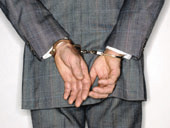Author: Laurence Cockcroft, Anne-Christine Wegener
ISBN No: 9781784536084
Review date: 25/04/2024
No of pages: 264
Publisher: IB Tauris
Publisher URL:
http://ibtauris.com/
Year of publication: 16/12/2016
Brief:
Unmasked: Corruption in the West, published by IB Tauris
Corruption is a challenge that we cannot afford to duck, say the authors of a new book, Unmasked: Corruption. Both authors have a background in the anti-corruption pressure group Transparency International (TI), and it shows: the wide (in terms of time and geography) of case studies, and the wide-ranging nature of their case in general; and the readiness to point fingers not only at the usual suspects (despots and elites), but others uncomfortably closer to home, such as financiers, sportsmen, police officers and democratically-elected politicians (and a whole industry lobbyists who may buy ‘influence’).
Countering corruption is not only a morally good thing, but it would lead to so much more good, including the sorts of things you might not readily link with corruption; aid money would do more at the grass-roots to educate the youth and treat the sick; ‘the incentives for human trafficking would be severely undermined’; terrorist cells (that use corruption to raise funds) would be thwarted. Other, desirable things – such as the efforts to stop the destruction of rain forests, for example – may also be thwarted by corruption.
While some would question how much progress TI or anyone has made in measuring corruption (to be fair, as the authors admit), let alone ranking countries in terms of how corrupt they are, in fairness that goes also for financial crime in general, and indeed all crime. And TI like the authors have their feet on the ground in terms of how well the world’s institutions are going about making a corruption-free world. The authors speak of the ‘apparently enthusiastic acceptance’ of the G20 leaders in 2015 for countering corruption.
The authors make plain there can be no magic wand or single step; there has to be a process: “Corruption is both insidious and dynamic and, once it has a hold, is always more likely to intensify than diminish.The fight against it requires constant vigilance, political courage and an unerring eye for cracks in the system,” they sensibly conclude.
The authors wisely point out at the start that corruption means ‘different things to different people’, and the book takes in their words ‘a very broad definition’, from bribery to cartels and ‘justice for sale’. Thus the book includes a couple of pages on the very low levels of tax paid by corporates such as Google, thanks to auditors and accountants from impeccable and large firms looking to avoid tax. We may deplore that; but is it corrupt? The authors also raise the fact that two million are in jail in the United States. That may be as the authors say ‘an indication of a failed justice system’, or it may not; but is that high number a result of corruption? If it is, the authors do not set out how; and thus they run the risk of diluting the powerful case that they have (in the case of ‘justice for sale’, who wants to buy justice, except those who know they are criminal?!).
Anyone who has a working or other interest in banking and big business in general, organised crime, and sport, besides fraud prevention in particular, can profit from reading one or more chapters. These topics and more are covered in reports on the Transparency International website; but the authors have done a service by bringing together their argument inside book covers.
The book is up to date enough to include the Volkswagen scandal of 2015 whereby the car-marker got around emissions regulation with ‘defeat devices’. In this case as others the authors note the ‘excuse’ given by the guilty organisation that it was due only to a ‘bad apple’, all too often an effort to limit damage and get away with doing as little about the problem – maybe wider-ranging and longer-term than is made public – as possible.
The authors do well to show us, beyond the publicised scandals, that corruption forces people into dilemmas, whether in boardrooms or sporting dressing rooms, or on trading floors or in parliaments. Corruption has real impacts; it spoils sports matches for fans, and denies ‘clean’ athletes their due; it denies voters a say compared with bribers who get their way; it gives commercial opportunities for organised crime; it makes it more possible for the incompetent to get on. The book only mentions in passing the ethical dilemma of whether or not to ‘blow the whistle’ on corruption; but in the case in the book, as in so many others, it ends poorly for the whistle-blower (compared, what is more, to the really guilty ones). The book shows the need for forensic analysis, and thus the opposite of transparency, secrecy – whether of political donations, or flows of money – is a bad thing, and maybe fishy. The authors speak of ‘secrecy jurisdictions’ (some English-speaking) that are ‘now rightly under unprecedented threat’.
Just a word about the layout and writing style of the book; both feel fresh and altogether free of the stodginess that could so easily have attended such a worthy subject. And the quite low price, compared with some books, is welcome too, to encourage non-specialists into buying.
About the authors
Laurence Cockcroft is a DevelopmentEconomist and Founder of Transparency International, the civil society group against corruption, a former Chairman of its UK chapter. He is the author of Global Corruption: Money, Power and Ethics in the Modern World; and, Africa’s Way: A Journey from the Past (both published by IB Tauris). Anne-Christine Wegener is an anti-corruption consultant. She was previously a Deputy Director and ProgrammeManager at Transparency International UK.










